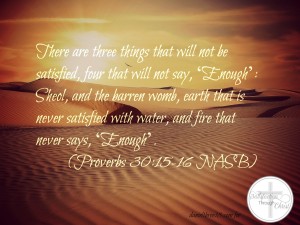Recently we donated all of our baby gear. Our “baby” turned six in January, and he is our only child. It’s very hard in the evangelical church to be single, childless, or have “only” one child. It’s equally hard to lay down your hope.
My husband and I aren’t really sure whether we have given up hope of having another child, or if we have come to accept that having only one child is God’s will for us.
Infertile Women in the Bible
I have studied every account of barren women in the Bible. “Studied” isn’t even really a strong enough word to do it justice. I’ve read, cross-referenced, memorized, researched, looked for hidden secret meanings (hey, sometimes you’re desperate), and pleaded with the Holy Spirit to reveal something – anything – that will show me that I will be like all of them, and someday be rewarded with a child in my womb.
My least favorite account is that of Rachel “give me children or I will die” wife of Jacob. I understand her desperation, her anger, her blame of her husband (Genesis 30:1). But her behavior is deplorable and selfish, on many accounts, not just in the realm of infertility.
My second least favorite account is that of Hannah. She promises God that if He just gives her a son, He can have him back. What? I just…what? (I Samuel 1:11). I mean, I get that she promises her son will be a Nazirite, but this means turning him over to the priests as soon as he’s weaned.
Our son is six, and I still have trouble letting him spend the night at his grandparents’ house (I know, I know…). I cannot imagine just turning him over to someone else…
My favorite account, on the other hand, is Elizabeth in the New Testament book of Luke. She is described as righteous, and she rejoiced when she became pregnant (Luke 1). She just seems so serene and God-honoring.
So I have studied, and prayed, and prayed, and studied. I begged the Holy Spirit to show me why *I* can’t have children when everyone else under the sun looks at her husband and turns up pregnant.
Except…the Holy Spirit showed me something else. Something no one else had ever shown me about what the Bible says about infertility.
Last year, I was reading through the Bible in one of those plans where you read a little bit each day from the Old & New Testaments. I got behind a bit, so I can’t remember exactly when I got to Proverbs, but it was later than it should have been.
This was God’s Providence.
Comfort from an “Odd” Place
I was having a particular rough time with our infertility. I know a lot of people think that they emotionally heal from being infertile, but I am beginning to strongly consider the possibility that my barrenness is my thorn in my flesh, like Paul mentions in II Corinthians. Maybe God allows this because it forces me to continually return to Him and to never rely upon myself for anything, especially anything spiritual (see II Corinthians 12:7-10).
Anyway, I was reading Proverbs 30, which I have probably read, I don’t know, a dozen times, when these verse practically leapt off the page:
“The leech has two daughters, ‘Give,’ ‘Give.’ There are three things that will not be satisfied, four that will not say, ‘Enough’: Sheol, and the barren womb, earth that is never satisfied with water, and fire that never says, ‘Enough’.” (Proverbs 30:15-16 NASB).
The barren womb will never be satisfied.
This is a passage in the middle of a section about how cruel people can be to the poor, and those particular people just never give up – they are never done being cruel to the poor. The author compares these cruel people to the four things that are never satisfied: Sheol, the barren womb, earth without water, and fire.
For days I repeated that verse to myself: “The barren womb will never be satisfied”. I had spent years feeling guilty about feeling unfulfilled because I was infertile, and here Scripture itself had my answer: the barren womb will never be satisfied.
And look at the other three things on that list: the grave (which is what “Sheol” is translated as in many other translations), parched land (drought), and fire. Those are horrible, sad, desperate situations: death and destruction are caused or are the result of all three of them.
God is directing the author, inspired by the Holy Spirit, to compare a continually cruel person to four of the most wicked things people of that time period – of any time period – understand: death, drought, fire…and infertility.
I cannot with any amount of words begin to describe the immense amount of comfort these verse brought to me.
The barren womb will never be satisfied.
Still…Not an Excuse
Does that mean I shouldn’t rejoice always? Absolutely not. I am still commanded by God to rejoice always (Philippians 4:4).
Does this mean I can’t experience peace? Absolutely not. God tells us in Philippians 4, through Paul, to “be anxious for nothing, but in everything by prayer and supplication with thanksgiving let your requests be made known to God. And the peace of God, which surpasses all comprehension, will guard your hearts and minds in Christ Jesus” (Philippians 4:6-7).
Does this invalidate the fruit of the Spirit found in Galatians 5:22-23? Of course not! I am still commanded to have love, joy, peace, patience, kindness, faithfulness, goodness, gentleness, and self-control, even if my barren womb is unsatisfied.
Do I need to feel guilty that I am sad over my infertility? Do I need to continually wonder if I am being punished, or if my husband and I are being tested in some strange way?
No.
The barren womb will never be satisfied.
My answer was in Scripture all along. Praise God!
Latest posts by Rachel (see all)
- Theology for Kids: Resources for Children - February 20, 2017
- Theology for Kids: Resources for Parents - February 13, 2017
- Theology for Kids: Talk About God - January 30, 2017




Incredibly insightful. I love the verse you chose to cling to. I have been able to carry two sons to full term with some medical issues. My doctor insisted that I accept the second pregnancy as my last and once completed he performed surgery to guarantee it. I loved my sons, but my heart grieved for what I could no longer do. I wanted a daughter so bad and I felt somehow “less” in the fact that I couldn’t carry a child. So many tried to comfort me but did not understand the hurt, anger and disappointment that I felt. I was told over and over again that I should be grateful for what I did have. I was grateful that they were healthy, but my heart wanted what it could not have. Later we adopted a little girl and she has fulfilled my prayers and my dreams. I am now old enough that I am past that stage of my life, but I can still relate to a barren womb never being satisfied.
Thank you for this sweet comment, Wendi. It’s hard when our bodies won’t do what we know they were created to do! Thanks for reading 🙂
Interesting insight. I appreciate your perspective on these versus
I on the other hand yes feel somewhat comforted by these verses about being barren however have wanted to have a child since I was 26 it certainly doesn’t encourage me in these verses.
It actually brings great pain and suffering that I have not born a child to my husband still at 46. What do you do with this first? Yes accept the fact I am barren but keep believing that God will use it for good.
Janet